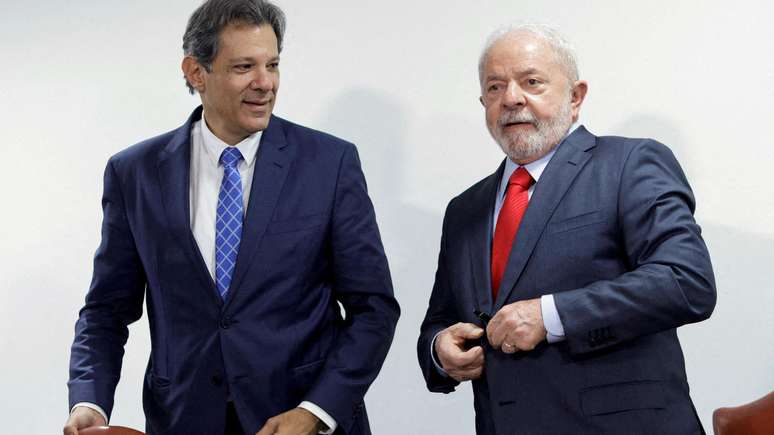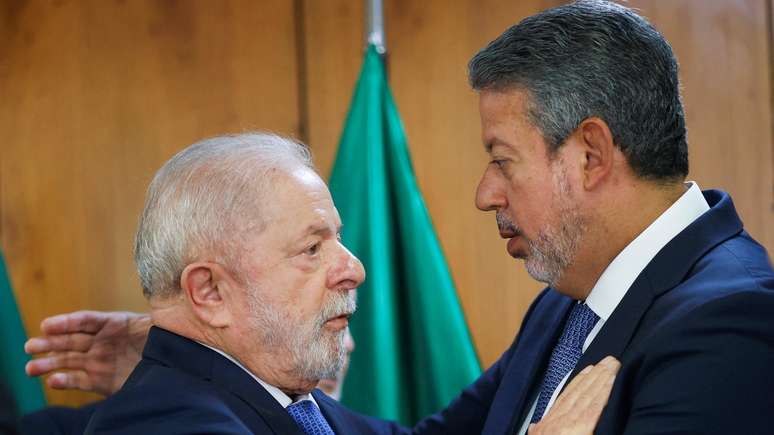The project passed easily among the deputies thanks to the articulation of the government with the leader of the Centrão. A convergence of interests explains this result, analysts say, something that may not be repeated in the future.
The approval of the new fiscal framework in the Chamber of Deputies was a victory for an alliance considered unlikely until recently between President Luiz Inácio Lula da Silva (PT) and the Speaker of the Chamber, Arthur Lira (PP-AL) and a good part of the so-called Centrão, a bloc that supported former president Jair Bolsonaro (PL) in his government.
Although it does not yet have a parliamentary base considered solid by analysts interviewed by BBC News Brasil, the government managed to approve the project with 372 votes in favour, 108 against and 1 abstention.
On Wednesday (24/05) the voting of the highlights is scheduled – proposed amendments to the bill. Subsequently it will be voted in the Senate and, if approved, it will go to presidential sanction.
The new fiscal framework is the set of rules that will guide the way the federal government can spend public resources and make investments.
It replaces the so-called spending ceiling, approved in 2016 during the government of Michel Temer (MDB) and which conditioned the increase in public spending to the growth of inflation.
In general terms, the new regulatory framework determines:
- a cap on government spending growth of 70% of the government’s annual revenue growth. If revenue increases by 1%, expenses can only increase by 0.7%, for example;
- a fixed range in government spending growth, ranging from 0.6% to 2.5% in scenarios of significant revenue increases.
The approval of the controversial project – considered the first major test of Lula’s parliamentary base – counted on Lira’s decisive support.
The President of the Chamber appointed deputy Cláudio Cajado (PP-BA), considered a man he trusted, as rapporteur.
It was also under his seal that the project was approved as a matter of urgency and therefore did not have to go through the thematic commissions as in the normal procedure.
The articulation between the government and Lira meant that the project was approved with ease. A minimum of 257 votes were needed, and history had another 115.
Another relevant data during the vote was the PL, Bolsonaro’s party, which freed up its bench, the largest in the Chamber with 99 parliamentarians, to vote as it wishes. Almost a third (29) of the party’s deputies voted in favor of Lula’s picture.
However, analysts warn that Tuesday evening’s victory does not necessarily mean that the Lula government has managed to consolidate a group of loyalists.
His assessment is that it was a circumstantial convergence: both Lula and Lira (and the Centrão, over which he exerts influence) were interested in advancing the agenda – a curious alignment which may not be repeated and which probably should be negotiated project for project.
history of tension
Expectations over relations between Lula and Lira were tense even before the PT candidate was elected in October last year.
Lira was a major supporter of Bolsonaro’s re-election in 2022. Despite this, he was one of the first political leaders to acknowledge Lula’s victory.
The speaker of the Chamber was also considered the main leader of the so-called “secret budget”, as the rapporteur’s amendments became known, which directed budget resources and were criticized for the lack of transparency on their authorship.
During the 2022 election campaign, Lula even said that the “secret budget” was Brazil’s “biggest shame”.
The “secret budget” was found unconstitutional by the Federal Supreme Court (STF) in December.
Lira was re-elected in 2022 and at the end of that year he was named the leading candidate to lead the current legislature, which will last until 2025.
In forming the government, Lula tried to attract Centrão parties into the federal administration. The strategy was seen as a way to weaken the opposition in Parliament.
Nonetheless, the perception of analysts was that the distribution of ministries would not be sufficient to obtain the parliamentary base wanted by Planalto.
Lula and his closest allies began to adopt a “non-aggression” stance towards Lira.
One of the examples was the failure of the PT to launch a candidacy for the mayoral presidency and the party’s support for Lira’s candidacy.
But, despite all the care, in the last five months there have been episodes in which the differences between the government and Lira have become evident.
In an interview with the newspaper O Globo on April 30 of this year, Lira criticized the political articulation of the government. According to him, offering ministries to parties would not solve the problem.
“There has been an arrangement and the formation of a coalition government, with the exchange of ministries for support, which has proven not to work. The amendments fix this without the need for a ministry,” he said.
The most evident episode of this tension was the overturning of the decrees signed which modified the points of the Basic Health Framework, at the beginning of May.
The regulatory framework had been approved by the National Congress in 2020 and the attempted modification brought about by the decrees was seen by MPs as an affront to Parliament.
On 3 May, with Lira’s backing, the Chamber approved a project that overturned part of the decrees signed by Lula.
The vote was considered the government’s first major parliamentary defeat and turned on the “yellow light”.
In the same interview with the O Globo newspaper, Lira criticized the government.
“Congress was elected completely differently than the Executive. There are governmental issues such as, for example, changes to the Sanitation Framework through enactments. Congress does not accept a law being changed in this way,” he said.
The origin of the covenant

But with so many points of tension in the relationship between Lira and Lula, what led to the alliance in the vote on the fiscal framework?
For Carla Beni, an economics professor at the Getúlio Vargas Foundation (FGV), the unlikely union between Lira and Lula in the vote on the fiscal framework happened because the agenda was important to both.
“I believe that without the support of Lira and (Rodrigo Pacheco) this framework would not have been approved. There was a very strong shift to the right in the elections for Parliament and Lira’s commitment was fundamental. But this happened because the picture was also important for Lira,” he says.
He says that the definition of a new fiscal framework had already been made last year, when, with the support of Lira, the National Congress approved the proposal for a constitutional amendment (PEC) of the Transition.
This guaranteed resources for the federal government to pay outstanding expenses, but forced Lula to pass a new set of tax rules by the end of the year.
Beni explains that one of the central points of the budget discussion is the allocation of funds through parliamentary amendments. According to her, this is one of the means by which Lira exerts influence on the benches of the Chamber.
Therefore, according to her, the approval of the fiscal framework was important for Lira because, therefore, there would have been a certain predictability on the amount of resources available for the amendments.
“In the discussion on government expenditure we have two lines: compulsory and non-compulsory. It is in these non-compulsory expenses that the parliamentary amendments are defined. From a financial point of view, it is a very large volume of resources”, said Carla Beni.
For Luciana Santana, professor of political science at the Federal University of Alagoas (UFAL), another element that made Lira adhere to the Lula government’s agenda was his link with economic actors.
“What leads Arthur Lira to approve this project is the pressure from economic agents who are not only tied to this program, but who are pressing for a fiscal responsibility program such as the new fiscal framework,” he said.
Both Carla Beni and Luciana Santana believe that the union between Lula and Lira in approving the fiscal framework does not mean guaranteeing the governability of Lula’s third term and that the votes will have to be discussed on a case-by-case basis.
“There is no perennial alliance between Lula and Lira. I think all these alliances will be temporary, momentary and according to the theme, the relevance and urgency of the themes,” he said.
Luciana Santana stresses that, so far, the facts show that alliances between Lira and the Lula government are “on the agenda”. She said, however, that new circumstances could bring the mayor closer to the government.
“It is not possible for us to say what these alliances will look like in the future. Today, what we can see is that these alliances are from agenda to agenda. But this can change depending on the agreements that are made between him or his party with the government This involves bargaining or filling positions,” he says.
The project had a good initial reception.
The government presented the proposed fiscal framework on March 30. On that date, the market reacted well to the announcement: the Ibovespa, the main stock index of the Brazilian Stock Exchange, closed up 1.89%.
BBC News Brasil respondents assessed that the government had done a good job of seeking earlier House and Senate leadership to present its plan and gather suggestions.
The previous policy, the spending ceiling, adopted by the Michel Temer government, stipulated that the growth of public spending was limited to the increase in inflation in the previous year.
But, over the years, Congress has passed changes to the constitution to create exceptions to the spending cap — such as in 2022, to allow for an increase in Auxílio Brasil, which effectively ended compliance with the cap.
Even in recent years the federal government has recorded primary deficits, that is, it has spent more than it collects, which translates into an increase in public debt.
With the framework approved, as well as some announced measures to boost revenues, the finance ministry plans to close the gap in 2024.
The government also saw an opportunity in the proposed fiscal framework to feel the temperature of its support in Congress, to expand spending on social programs and investments, and to stimulate the lowering of the basic interest rate (SELIC) by the Central Bank.
This is because, when the government limits the expansion of its expenditure, it contributes to less warming of economic activity, slowing the rise in prices.
Source: Terra
Rose James is a Gossipify movie and series reviewer known for her in-depth analysis and unique perspective on the latest releases. With a background in film studies, she provides engaging and informative reviews, and keeps readers up to date with industry trends and emerging talents.






